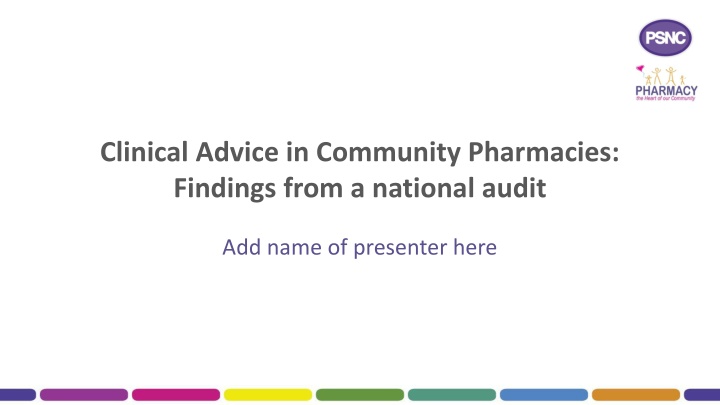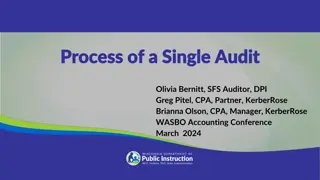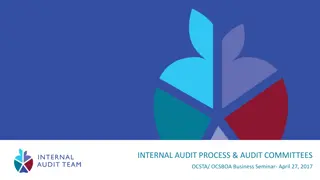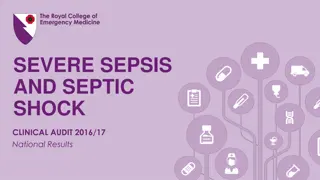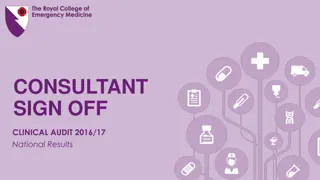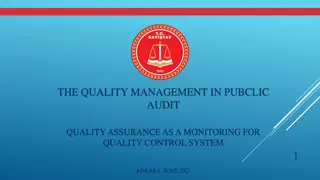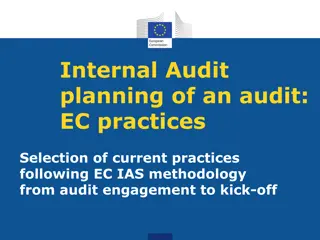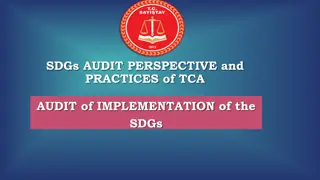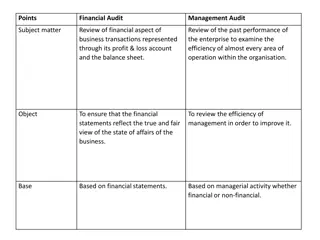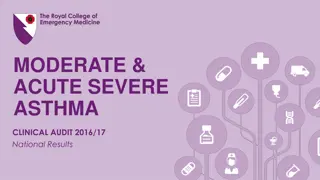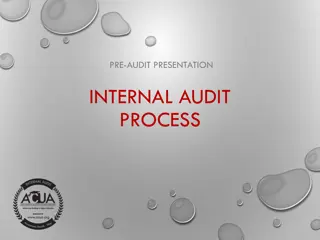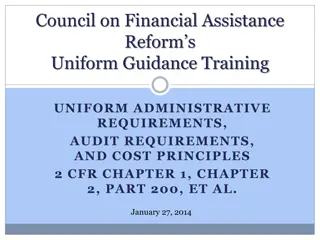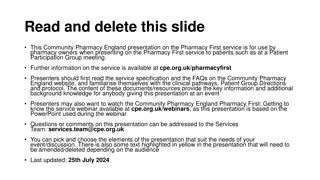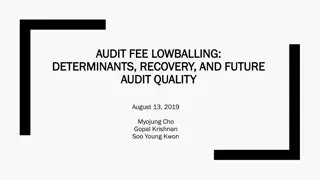Role of Community Pharmacies in Providing Clinical Advice: National Audit Insights
Community pharmacies play a crucial role in providing clinical advice for minor health conditions, serving as a first point of contact for many patients. Despite not formally recording individual consultations, pharmacies have seen an increase in patient visits, especially since the COVID-19 pandemic. The Community Pharmacist Consultation Service (CPCS) and informal patient consultations are common practices, showcasing the significant impact pharmacies have on public health.
Download Presentation

Please find below an Image/Link to download the presentation.
The content on the website is provided AS IS for your information and personal use only. It may not be sold, licensed, or shared on other websites without obtaining consent from the author.If you encounter any issues during the download, it is possible that the publisher has removed the file from their server.
You are allowed to download the files provided on this website for personal or commercial use, subject to the condition that they are used lawfully. All files are the property of their respective owners.
The content on the website is provided AS IS for your information and personal use only. It may not be sold, licensed, or shared on other websites without obtaining consent from the author.
E N D
Presentation Transcript
Clinical Advice in Community Pharmacies: Findings from a national audit Add name of presenter here
Community pharmacy: an introduction 11,200 pharmacies in England situated in high-street locations, supermarkets and residential neighbourhoods 89% of the population can reach their local community pharmacy within a 20 minute walk An estimated 1.6 million visits take place daily, of which 1.2 million are for health-related reasons
A first port of call for minor health conditions Pharmacies long promoted as a first port of call by the NHS Nearly all pharmacies are Healthy Living Pharmacies Formal route for referrals for minor conditions from NHS 111 via the Community Pharmacist Consultation Service (CPCS) Referrals from GP practices rolling out this autumn
A first port of call for minor health conditions Pharmacies do not record individual advice consultations with patients But patients seem to be visiting them more and more A recent PAGB survey found people were more likely to visit a pharmacy for advice since the COVID-19 pandemic We expect this trend to continue
Pharmacy funding for advice consultations CPCS referrals have a fee attached: over 300,000 consultations since October 2019 Core pharmacy funding does include some monies for self-care advice But this is not linked to the actual numbers of people pharmacies help and this role is increasing beyond what national negotiators believe is covered by this funding element
PSNCs Pharmacy Advice Audit PSNC is the national negotiator for community pharmacies They asked pharmacies to record their patient consultations on a single day in June or July 2020 9,411 pharmacies in England took part 198,043 patient consultations were recorded All of these were outside formal referral routes The average pharmacy carries out around 15 of these informal patient consultations per day
What do the consultations look like? 79% were carried out face-to-face 20% were carried out by telephone, with very few carried out online 63% of patients pharmacy team to respond to their symptoms 18% sought help for an existing medical condition 9% needed healthy living advice required the
What do the consultations look like? 92% resulted in advice being given In just 49% of consultations this was accompanied by the sale of a medicine Appropriate advice alone was given in 43% of consultations The average staff time per consultation was just over 5 minutes Around 75 minutes pharmacy, is spent providing this advice per day, per
Reducing pressure on other parts of the NHS Fewer than 10% of the consultations resulted in patients being referred to their GP Yet 49% of patients said that if the pharmacy had not been there, they would have visited their GP A further 5.7% would have visited A&E / Walk-in centre This suggests that if pharmacy advice were taken away, there could be 492,000 additional GP appointments each week, or 65 appointments in each GP practice each week in England
Conclusions Patients value the advice that they can receive from local pharmacies and this is taking considerable pressure of other parts of the NHS But pharmacies are struggling to sustain this level of support given the financial and workload challenges they face, particularly in light of the pandemic Pharmacies need appropriate funding and support for their critical role
